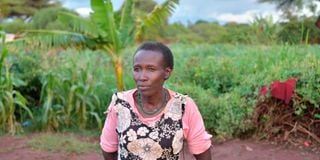How Isiolo is promoting uptake of family planning

What you need to know:
- With more sensitisation by community health workers, more women are now opting for long-term family planning methods.
- Surprisingly, some men are going the vasectomy way.
At 30, Ms Pauline Jamhuri (right) is already a mother of seven. She conceived her firstborn daughter, now 15, at the age of 14. In the next 15 years, she would go on to give birth to six more children.
Like many uneducated and poor women in the third world, Ms Jamhuri had never heard of modern contraceptives by the time she had her fourth child. When she learnt about contraception, she was relieved. Only her husband, Mr Kipruto Rono, wanted nothing to do with it. He wanted more children, leaving her with no choice.
After her fifth child, she could not take it anymore. She secretly went for the three-year birth control implant, risking battery and divorce from her husband. “Life was very tough. My husband spent all his money on alcohol. I wish I had known about contraceptives earlier,’’ she says.
But now a reformed Mr Rono wishes he had known about contraception earlier. “I wrongly assumed that family planning meant not having children anymore,’’he recounts.
In the pastoral communities of Isiolo, Turkana and Samburu counties, many men remain skeptical of the modern contraceptives. To them, children are regarded as wealth. The more the better. Here, women give birth to 12 children on average, according to Ibrahim Alio, the chief health officer in Isiolo County.
Besides cultural beliefs, ignorance and misinformation fuel hostility towards contraception. Even so, brave women from these pastoral communities are now embracing family planning, thanks to the work of community health volunteers (CHVs) who traverse the counties sensitising residents on their benefits.
“There’s more acceptance nowadays. Husbands are now allowing their wives to attend our women support group sessions,’’ says Miriam Mbithe, a CHV who has worked in Isiolo County for three years.
This comes at a time when the government in collaboration with donor agencies such as the United Nations Population Fund (UNFPA) is gearing up efforts to increase the uptake of contraceptives by women in the dominantly pastoralist communities.
At the Anti-Poaching Unit dispensary just outside Isiolo town, mothers attend not only antenatal clinics, but also family planning sessions with healthcare workers.
"Some women had told me that I would get fat after taking my pills. But I got the truth from the doctor. I am a happy mother,” Mackline Kanana, 25, a mother of two, tells Healthy Nation.
Mr Don Manjau, a nursing officer at the dispensary, says most residents prefer using herbal concoctions, calculation of a woman’s safe days or coital withdrawal to modern contraceptives.
With more sensitisation by the CHVs, however, Mr Manjau notes that more women are now opting for long-term family planning methods. Surprisingly, some men are going the vasectomy way, he says.
But to work as a community health volunteer here comes with heavy risks too, owing to insecurity in the pastoral counties in northern Kenya. In some instances, CHVs have come face-to-face with gun-wielding warriors who threatened them.
Inadequacy of health facilities, few skilled personnel and cultural factors such as female genital mutilation and early marriages too hamper the uptake of contraceptives. Sometimes these challenges are compounded by inability by the county to pay for drugs delivered by the Kenya Medical Supplies Authority (Kemsa).
At one point, Isiolo was ranked fifth among counties with the worst health indicators, a situation that Mr Alio says is being reversed progressively.
So far, 800 CHVs have been stationed at 50 health units in the county to assist in registering pregnant mothers, and ensuring that they attend antenatal clinics and deliver at health facilities to reduce maternal deaths. After years of agony, there’s finally hope for better maternal health in this county.
However, Ms Charity Koronya, UNFPA’s family planning and commodity security specialist, is concerned over the government’s over-reliance on donors to fund the family planning programme in the country.
“Kenya is a low middle income country, the focus is to increase domestic financing for family planning and we are looking forward to the country taking over the programme . The donors and the government have agreed upon this and the latter has committed to fully fund the family planning programmes by 2026,” she observed.





